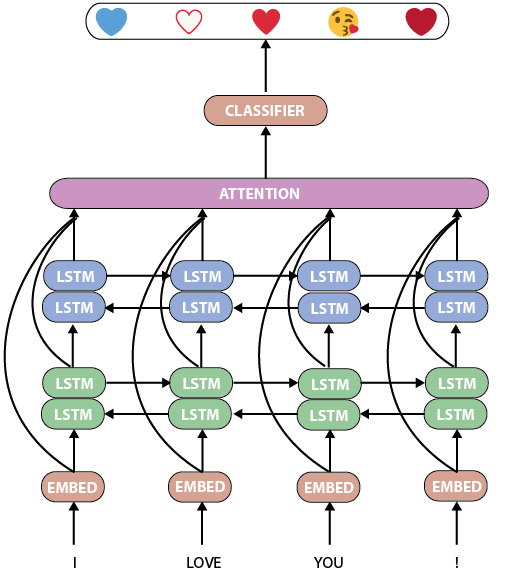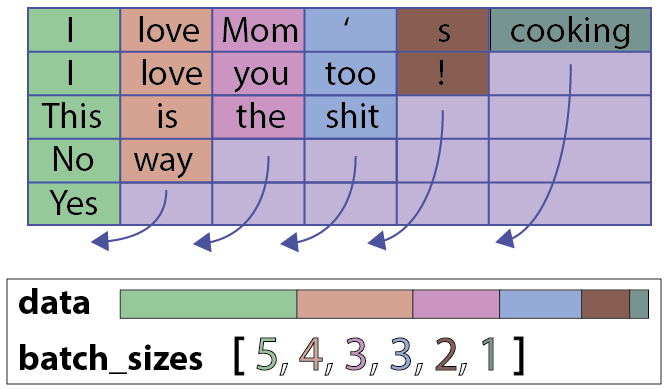情感情绪检测是自然语言理解的关键要素。最近,我们将原来的项目迁移到了新的集成系统上,该系统基于麻省理工学院媒体实验室推出的NLP模型搭建而成。
代码已经开源了!(详见GitHub:https://github.com/huggingface/torchMoji)
该模型最初的设计使用了TensorFlow、Theano和Keras,接着我们将其移植到了pyTorch上。与Keras相比,pyTorch能让我们更自由地开发和测试各种定制化的神经网络模块,并使用易于阅读的numpy风格来编写代码。在这篇文章中,我将详细说明在移植过程中出现的几个有趣的问题:
- 如何使用自定义激活功能定制pyTorch LSTM
- PackedSequence对象的工作原理及其构建
- 如何将关注层从Keras转换成pyTorch
- 如何在pyTorch中加载数据:DataSet和Smart Batching
- 如何在pyTorch中实现Keras的权重初始化
首先,我们来看看torchMoji/DeepMoji的模型。它是一个相当标准而强大的人工语言处理神经网络,具有两个双LSTM层,其后是关注层和分类器:

torchMoji/DeepMoji模型
如何构建一个定制化的pyTorch LSTM模块
DeepMoji有一个很不错的特点:Bjarke Felbo及其协作者能够在一个拥有16亿条记录的海量数据集上训练该模型。因此,预先训练的模型在此训练集中具有非常丰富的情感和情绪表征,我们可以很方便地使用这个训练过的模型。
该模型是使用针对LSTM的回归内核的Theano/Keras默认激活函数hard sigmoid训练的,而pyTorch是基于NVIDIA的cuDNN库建模的,这样,可获得原生支持LSTM的GPU加速与标准的sigmoid回归激活函数:

Keras默认的LSTM和pyTorch默认的LSTM
因此,我写了一个具有hard sigmoid回归激活函数的自定义LSTM层:
def LSTMCell(input, hidden, w_ih, w_hh, b_ih=None, b_hh=None):
"""
A modified LSTM cell with hard sigmoid activation on the input, forget and output gates.
"""
hx, cx = hidden
gates = F.linear(input, w_ih, b_ih) + F.linear(hx, w_hh, b_hh)
ingate, forgetgate, cellgate, outgate = gates.chunk(4, 1)
ingate = hard_sigmoid(ingate)
forgetgate = hard_sigmoid(forgetgate)
cellgate = F.tanh(cellgate)
outgate = hard_sigmoid(outgate)
cy = (forgetgate * cx) + (ingate * cellgate)
hy = outgate * F.tanh(cy)
return hy, cy
def hard_sigmoid(x):
"""
Computes element-wise hard sigmoid of x.
See e.g. https://github.com/Theano/Theano/blob/master/theano/tensor/nnet/sigm.py#L279
"""
x = (0.2 * x) + 0.5
x = F.threshold(-x, -1, -1)
x = F.threshold(-x, 0, 0)
return x |
这个LSTM单元必须集成在一个完整的模块中,这样才可以使用pyTorch所有的功能。这个集成相关的代码很长,建议直接引用到Github中的相关源代码。
Keras和pyTorch中的关注层
模型的关注层是一个有趣的模块,我们可以分别在Keras和pyTorch的代码中进行比较:
class Attention(Module):
"""
Computes a weighted average of channels across timesteps (1 parameter pr. channel).
"""
def __init__(self, attention_size, return_attention=False):
""" Initialize the attention layer
# Arguments:
attention_size: Size of the attention vector.
return_attention: If true, output will include the weight for each input token
used for the prediction
"""
super(Attention, self).__init__()
self.return_attention = return_attention
self.attention_size = attention_size
self.attention_vector = Parameter(torch.FloatTensor(attention_size))
def __repr__(self):
s = '{name}({attention_size}, return attention={return_attention})'
return s.format(name=self.__class__.__name__, **self.__dict__)
def forward(self, inputs, input_lengths):
""" Forward pass.
# Arguments:
inputs (Torch.Variable): Tensor of input sequences
input_lengths (torch.LongTensor): Lengths of the sequences
# Return:
Tuple with (representations and attentions if self.return_attention else None).
"""
logits = inputs.matmul(self.attention_vector)
unnorm_ai = (logits - logits.max()).exp()
# Compute a mask for the attention on the padded sequences
# See e.g. https://discuss.pytorch.org/t/self-attention-on-words-and-masking/5671/5
max_len = unnorm_ai.size(1)
idxes = torch.arange(0, max_len, out=torch.LongTensor(max_len)).unsqueeze(0)
if torch.cuda.is_available():
idxes = idxes.cuda()
mask = Variable((idxes < input_lengths.unsqueeze(1)).float())
# apply mask and renormalize attention scores (weights)
masked_weights = unnorm_ai * mask
att_sums = masked_weights.sum(dim=1, keepdim=True) # sums per sequence
attentions = masked_weights.div(att_sums)
# apply attention weights
weighted = torch.mul(inputs, attentions.unsqueeze(-1).expand_as(inputs))
# get the final fixed vector representations of the sentences
representations = weighted.sum(dim=1)
return (representations, attentions if self.return_attention else None)
class AttentionWeightedAverage(Layer):
"""
Computes a weighted average of the different channels across timesteps.
Uses 1 parameter pr. channel to compute the attention value for a single timestep.
"""
def __init__(self, return_attention=False, **kwargs):
self.init = initializers.get('uniform')
self.supports_masking = True
self.return_attention = return_attention
super(AttentionWeightedAverage, self).__init__(** kwargs)
def build(self, input_shape):
self.input_spec = [InputSpec(ndim=3)]
assert len(input_shape) == 3
self.W = self.add_weight(shape=(input_shape[2], 1),
name='{}_W'.format(self.name),
initializer=self.init)
self.trainable_weights = [self.W]
super(AttentionWeightedAverage, self).build(input_shape)
def call(self, x, mask=None):
# computes a probability distribution over the timesteps
# uses 'max trick' for numerical stability
# reshape is done to avoid issue with Tensorflow
# and 1-dimensional weights
logits = K.dot(x, self.W)
x_shape = K.shape(x)
logits = K.reshape(logits, (x_shape[0], x_shape[1]))
ai = K.exp(logits - K.max(logits, axis=-1, keepdims=True))
# masked timesteps have zero weight
if mask is not None:
mask = K.cast(mask, K.floatx())
ai = ai * mask
att_weights = ai / K.sum(ai, axis=1, keepdims=True)
weighted_input = x * K.expand_dims(att_weights)
result = K.sum(weighted_input, axis=1)
if self.return_attention:
return [result, att_weights]
return result
def get_output_shape_for(self, input_shape):
return self.compute_output_shape(input_shape)
def compute_output_shape(self, input_shape):
output_len = input_shape[2]
if self.return_attention:
return [(input_shape[0], output_len), (input_shape[0], input_shape[1])]
return (input_shape[0], output_len)
def compute_mask(self, input, input_mask=None):
if isinstance(input_mask, list):
return [None] * len(input_mask)
else:
return None |
如你所见,主要的算法大致相同,但PyTorch代码中的大部分都是注释,而Keras则需要编写几个附加函数并进行调用。
*在编写和调试自定义模块和层时,pyTorch是一个更快的选择;而对于快速训练和测试由标准层构建的模型时,Keras显然更加合适。
PackedSequence对象的工作原理
Keras有一个不错的掩码功能可以用来处理可变长度序列。那么在pyTorch中又该如何处理这个呢?可以使用PackedSequences! pyTorch文档中有关PackedSequence的介绍并不是很详细,所以这里会详细描述它的细节。

一个拥有5个序列18个令牌的典型NLP批次
假设我们有一批可变长度的序列(在NLP应用中通常就是这样的)。为了在GPU上并行计算这样一个批次,我们希望:
- 尽可能多地并行处理这个序列,因为LSTM隐藏状态依赖于每个序列的前一个时间步长,以及
- 以正确的时间步长(每个序列的结尾)停止每个序列的计算。
这可以通过使用pyTorch中的PackedSequence类来实现。我们首先通过减少长度来对序列进行排序,并将它们放到在张量中。然后对张量和序列长度列表调用pack_padded_sequence函数
# input_seqs is a batch of input sequences as a numpy array of integers (word indices in vocabulary) padded with zeroas
input_seqs = Variable(torch.from_numpy(input_seqs.astype('int64')).long())
# First: order the batch by decreasing sequence length
input_lengths = torch.LongTensor([torch.max(input_seqs[i, :].data.nonzero()) + 1 for i in range(input_seqs.size()[0])])
input_lengths, perm_idx = input_lengths.sort(0, descending=True)
input_seqs = input_seqs[perm_idx][:, :input_lengths.max()]
# Then pack the sequences
packed_input = pack_padded_sequence(input_seqs, input_lengths.cpu().numpy(), batch_first=True) |
PackedSequence对象包括:
- 一个data对象:一个torch.Variable(令牌的总数,每个令牌的维度),在这个简单的例子中有五个令牌序列(用整数表示):(18,1)
- 一个batch_sizes对象:每个时间步长的令牌数列表,在这个例子中为:[6,5,2,4,1]
用pack_padded_sequence函数来构造这个对象非常的简单:

如何构造一个PackedSequence对象(batch_first = True)
PackedSequence对象有一个很不错的特性,就是我们无需对序列解包(这一步操作非常慢)即可直接在PackedSequence数据变量上执行许多操作。特别是我们可以对令牌执行任何操作(即对令牌的顺序/上下文不敏感)。当然,我们也可以使用接受PackedSequence作为输入的任何一个pyTorch模块(pyTorch 0.2)。
例如,在我们的NLP模型中,我们可以在对PackedSequence对象不解包的情况下连接两个LSTM模块的输出,并在此对象上应用LSTM。我们还可以在不解包的情况下执行关注层的一些操作。
pyTorch中的智能数据加载:DataSets和Batches
在Keras中,数据加载和批处理通常隐藏在fit_generator函数中。重申一遍,如果你想要快速地测试模型,Keras很好用,但这也意味着我们不能完全控制模型中的重要部分。
在pyTorch中,我们将使用三个类来完成这个任务:
- 一个DataSet类,用于保存、预处理和索引数据集
- 一个BatchSampler类,用于控制样本如何批量收集
- 一个DataLoader类,负责将这些批次提供给模型
我们的DataSet类非常简单:
class DeepMojiDataset(Dataset):
""" A simple Dataset class.
# Arguments:
X_in: Inputs of the given dataset.
y_in: Outputs of the given dataset.
# __getitem__ output:
(torch.LongTensor, torch.LongTensor)
"""
def __init__(self, X_in, y_in):
# Check if we have Torch.LongTensor inputs (assume Numpy array otherwise)
if not isinstance(X_in, torch.LongTensor):
X_in = torch.from_numpy(X_in.astype('int64')).long()
if not isinstance(y_in, torch.LongTensor):
y_in = torch.from_numpy(y_in.astype('int64')).long()
self.X_in = torch.split(X_in, 1, dim=0)
self.y_in = torch.split(y_in, 1, dim=0)
def __len__(self):
return len(self.X_in)
def __getitem__(self, idx):
return self.X_in[idx].squeeze(), self.y_in[idx].squeeze() |
我们BatchSampler则更有趣。
我们有几个小的NLP数据集,用于微调情感情绪检测模型。这些数据集有着不同的长度和某些不平衡的种类,所以我们想设计这么一个批量采样器:
- 在预先定义的样本数中收集批次,这样我们的训练过程就可以不依赖于批次的长度能够从不平衡的数据集中以平衡的方式进行采样。
- 在PyTorch中,BatchSampler是一个可以迭代生成批次的类,BatchSampler的每个批处理都包含一个列表,其中包含要在DataSet中选择的样本的索引。
因此,我们可以定义一个用数据集类标签向量来初始化的BatchSampler对象,以构建满足我们需求的批次列表:
class DeepMojiBatchSampler(object):
"""A Batch sampler that enables larger epochs on small datasets and
has upsampling functionality.
# Arguments:
y_in: Labels of the dataset.
batch_size: Batch size.
epoch_size: Number of samples in an epoch.
upsample: Whether upsampling should be done. This flag should only be
set on binary class problems.
seed: Random number generator seed.
# __iter__ output:
iterator of lists (batches) of indices in the dataset
"""
def __init__(self, y_in, batch_size, epoch_size, upsample, seed):
self.batch_size = batch_size
self.epoch_size = epoch_size
self.upsample = upsample
np.random.seed(seed)
if upsample:
# Should only be used on binary class problems
assert len(y_in.shape) == 1
neg = np.where(y_in.numpy() == 0)[0]
pos = np.where(y_in.numpy() == 1)[0]
assert epoch_size % 2 == 0
samples_pr_class = int(epoch_size / 2)
else:
ind = range(len(y_in))
if not upsample:
# Randomly sample observations in a balanced way
self.sample_ind = np.random.choice(ind, epoch_size, replace=True)
else:
# Randomly sample observations in a balanced way
sample_neg = np.random.choice(neg, samples_pr_class, replace=True)
sample_pos = np.random.choice(pos, samples_pr_class, replace=True)
concat_ind = np.concatenate((sample_neg, sample_pos), axis=0)
# Shuffle to avoid labels being in specific order
# (all negative then positive)
p = np.random.permutation(len(concat_ind))
self.sample_ind = concat_ind[p]
label_dist = np.mean(y_in.numpy()[self.sample_ind])
assert(label_dist > 0.45)
assert(label_dist < 0.55)
def __iter__(self):
# Hand-off data using batch_size
for i in range(int(self.epoch_size/self.batch_size)):
start = i * self.batch_size
end = min(start + self.batch_size, self.epoch_size)
yield self.sample_ind[start:end]
def __len__(self):
# Take care of the last (maybe incomplete) batch
return (self.epoch_size + self.batch_size - 1) // self.batch_size |
从Keras到pyTorch:不要忘记初始化
将Keras/Tensorflow/Theano代码移植到pyTorch的过程中,最后需要注意的事情是对权重的初始化。
Keras在开发速度方面的另一个强大特点是层的默认初始化。
相反,pyTorch并没有初始化权重,而是由开发者自己来决定。为了在微调权重时获得一致的结果,我们将像如下代码那样复制默认的Keras权重初始化:
def init_weights(self):
"""
Here we reproduce Keras default initialization weights to initialize Embeddings/LSTM weights
"""
ih = (param.data for name, param in self.named_parameters() if 'weight_ih' in name)
hh = (param.data for name, param in self.named_parameters() if 'weight_hh' in name)
b = (param.data for name, param in self.named_parameters() if 'bias' in name)
nn.init.uniform(self.embed.weight.data, a=-0.5, b=0.5)
for t in ih:
nn.init.xavier_uniform(t)
for t in hh:
nn.init.orthogonal(t)
for t in b:
nn.init.constant(t, 0) |
结论
当我们针对一个模型比较Keras和pyTorch这两个框架时,我们可以感觉到它们有着不同的哲学和目标。
根据我的经验来看:
- Keras非常适合于快速测试在给定任务上组合标准神经网络块的各种方法;
- pyTorch非常适合于快速开发和测试自定义的神经网络模块,因为它有着很大的自由度和易于阅读的numpy风格的代码。
|
